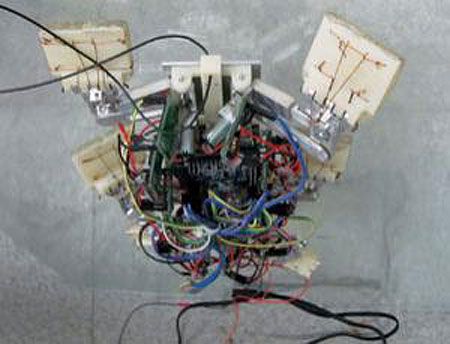Climbing Robot Squirts Honey On Its Feet For Sticking Power
Pretty sweet: this climbing robot uses a mixture of honey and water to help it stick to glass
Insects climb in a couple different ways. On rough surfaces, they usually rely on small claws (kinda like Spinybot), but on smooth surfaces, some insects secrete an oily fluid to help turn pads on their feet into little suction cups of a sort. Minghe Li, a roboticist at Tongji University in Shanghai, has created a climbing robot that mimics this capability using pliable silicon feet that squirt out a mixture of honey and water onto the climbing surface.
It only takes a very little bit of liquid for the feet to stick, and while the robot currently can't climb slopes past 75 degrees, this method may ultimately prove to be as effective as the gecko-type sticky foot on smooth surfaces and more effective on rough or wet surfaces, which the gecko adhesive has trouble with. Also, making artificial gecko feet is tricky and expensive, while making honey just involves being nice to bees.
Li is currently adapting his robot's feet to better emulate those of insects to try to improve its climbing effectiveness. He's also, I imagine, looking for a way to clean up the sticky little footprints that are undoubtedly all over his lab.
Via [ New Scientist ]
Evan Ackerman is a senior editor at IEEE Spectrum. Since 2007, he has written over 6,000 articles on robotics and technology. He has a degree in Martian geology and is excellent at playing bagpipes.
